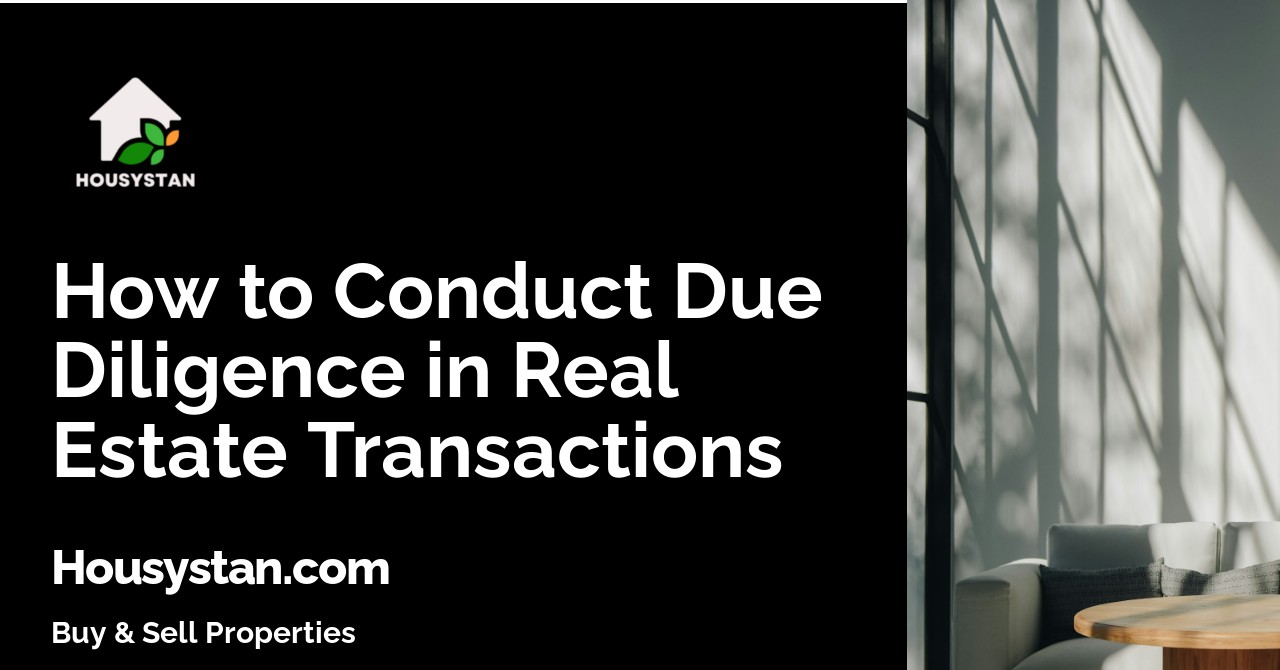How to Conduct Due Diligence in Real Estate Transactions
Read latest blogs and articles from Housystan

The Information mentioned here was last updated on:
29/1/2026How to Conduct Due Diligence in Real Estate Transactions
When diving into the real estate market, whether you're buying your first home or adding another property to your portfolio, due diligence is a crucial step that shouldn't be overlooked. It’s the process of thoroughly checking the property and its paperwork to ensure that you're making a sound investment. A well-executed due diligence process can save you from potential headaches and financial pitfalls down the line.
Understanding Due Diligence
- Verified Tenants/Buyers
- Unlimited Property Listing
- Zero subscription/charges fee
Before jumping into the specifics, let’s break down what due diligence actually means. In the context of real estate, due diligence refers to a comprehensive appraisal of a property to ensure that everything is in order before you sign on the dotted line. It's akin to examining a car thoroughly before purchase, ensuring it’s in good condition and that you aren’t getting a raw deal.
Why Due Diligence Matters
Due diligence can reveal crucial information about a property that might not be immediately obvious. This includes legal issues, physical defects, and any pending zoning changes that could affect the property’s value. By conducting due diligence, buyers can negotiate better terms, seek repairs, or even back out of a deal if necessary.
Key Components of Real Estate Due Diligence
1. Financial Due Diligence
The financial aspect is often the first thing potential buyers consider. This involves reviewing any financial documents related to the property to ensure everything checks out. For investors, this means looking into rental income, operational costs, taxes, and any existing liens on the property.
Check the current market value to ensure you’re paying a fair price. An appraisal from a certified professional is essential in this step, as it gives you an accurate picture of the property’s worth in the current market.
2. Legal Due Diligence
Legal checks are vital to ensure there are no surprises after the purchase. Begin by verifying the property’s title to confirm that the seller has the full right to sell. Engaging a title company or a real estate attorney can help identify any title issues like liens, easements, or ownership disputes that may exist.
Review all the legal agreements related to the property, including but not limited to lease agreements, service contracts, and any declarations against the property. It’s also wise to check zoning laws to ensure that your intended use of the property complies with local regulations.
3. Physical Due Diligence
A thorough inspection of the property’s physical state is crucial. Hire a professional inspector to examine the property for structural integrity, electrical systems, plumbing, HVAC systems, and potential pest issues. The inspector’s report will highlight any repairs that need immediate attention or that could lead to bigger issues in the future.
Consider environmental due diligence if there's a risk of contamination or if the property is in a flood zone. An environmental site assessment can identify potential issues with soil, air, or water quality, which might not be covered in a standard property inspection.
4. Neighborhood and Community Evaluation
Understanding the community around your potential property is as important as the property itself. Research the local government infrastructure projects that may increase or decrease property value. Check for proximity to amenities such as schools, hospitals, shopping centers, and public transportation.
Crime rates and neighborhood demographics provide further insight into the safety and culture of the area. Visit the neighborhood at different times of the day and week to get a sense of the daily activity and noise level.
Steps in Conducting Due Diligence
Start With Research
Begin with online research. Plenty of resources are available to help you gather information about a neighborhood or specific property. Use real estate websites, local government records, and crime mapping services to get an initial overview.
Engage Professionals
Hire professionals such as real estate agents, attorneys, inspectors, and appraisers. These experts bring experience and can uncover issues you might miss.
Document Everything
Keep detailed records of all findings during the due diligence process. This might include reports from inspections and assessments, emails or letters exchanged with agents or sellers, and any permits or legal documents related to the property.
Negotiate or Reconsider
If due diligence uncovers issues, there are a few routes you can take. For minor problems, negotiate repairs or a lower purchase price with the seller. For significant concerns, you may need to reconsider your interest in the property altogether.
Best Practices for Success
Stay Organized
A structured approach, like a checklist, helps keep track of tasks and ensures no stone is left unturned. Checklists facilitate effective communication with your team of professionals and help in systematically evaluating all aspects of the property.
Be Thorough
Don't rush through your due diligence. Taking the time to thoroughly investigate each aspect can save major headaches and financial loss down the line.
Keep Emotions in Check
It's easy to become emotionally attached to a property, but it's important to remain detached. Keep an analytical mindset to make sure facts guide your decisions, not emotions.
Use Technology
There are various apps and online platforms designed to assist with real estate due diligence. Leverage these tools for a more efficient and effective process.
This comprehensive approach to due diligence will help ensure that your real estate investment is sound, protecting your finances and peace of mind. Taking the time to perform due diligence can prevent costly mistakes and pave the way to a successful property acquisition.